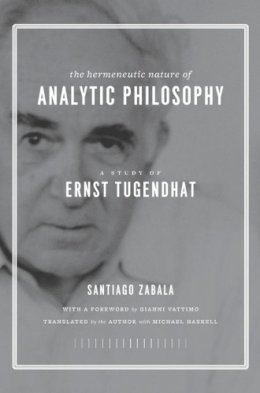
Stock image for illustration purposes only - book cover, edition or condition may vary.
The Hermeneutic Nature of Analytic Philosophy. A Study of Ernst Tugendhat.
Santiago Zabala
€ 87.87
FREE Delivery in Ireland
Description for The Hermeneutic Nature of Analytic Philosophy. A Study of Ernst Tugendhat.
Philosophers, analytic as well as continental, tend to feel uneasy about Ernst Tugendhat, who, though he positions himself in the analytic field, poses questions in the Heideggerian style. This book aims to present Tugendhat as an example of merged horizons, and to prove that any such labels impoverish philosophical research. Translator(s): Haskell, Michael. Num Pages: 264 pages. BIC Classification: HPC. Category: (P) Professional & Vocational. Dimension: 210 x 140 x 20. Weight in Grams: 408.
Contemporary philosopher-analytic as well as continental--tend to feel uneasy about Ernst Tugendhat, who, though he positions himself in the analytic field, poses questions in the Heideggerian style. Tugendhat was one of Martin Heidegger's last pupils and his least obedient, pursuing a new and controversial critical technique. Tugendhat took Heidegger's destruction of Being as presence and developed it in analytic philosophy, more specifically in semantics. Only formal semantics, according to Tugendhat, could answer the questions left open by Heidegger. Yet in doing this, Tugendhat discovered the latent "hermeneutic nature of analytic philosophy"--its post-metaphysical dimension-in which "there are no facts, but only true propositions." What Tugendhat seeks to answer is this: What is the meaning of thought following the linguistic turn? Because of the rift between analytic and continental philosophers, very few studies have been written on Tugendhat, and he has been omitted altogether from several histories of philosophy. Now that these two schools have begun to reconcile, Tugendhat has become an example of a philosopher who, in the words of Richard Rorty, "built bridges between continents and between centuries." Tugendhat is known more for his philosophical turn than for his phenomenological studies or for his position within analytic philosophy, and this creates some confusion regarding his philosophical propensities. Is Tugendhat analytic or continental? Is he a follower of Wittgenstein or Heidegger? Does he belong in the culture of analysis or in that of tradition? Santiago Zabala presents Tugendhat as an example of merged horizons, promoting a philosophical historiography that is concerned more with dialogue and less with classification. In doing so, he places us squarely within a dialogic culture of the future and proves that any such labels impoverish philosophical research.
Product Details
Publication date
2008
Publisher
Columbia University Press United States
Number of pages
264
Condition
New
Number of Pages
264
Format
Hardback
Place of Publication
New York, United States
ISBN
9780231143882
SKU
V9780231143882
Shipping Time
Usually ships in 7 to 11 working days
Ref
99-1
About Santiago Zabala
Gianni Vattimo is emeritus professor of philosophy at the University of Turin and a member of the European Parliament. His books with Columbia University Press include A Farewell to Truth; The Responsibility of the Philosopher; Christianity, Truth, and Weakening Faith: A Dialogue (with Rene Girard); Not Being God: A Collaborative Autobiography (with Piergiorgio Paterlini); Art's Claim to Truth; After the Death of God (with John D. Caputo); Dialogue with Nietzsche; The Future of Religion (with Richard Rorty); Nihilism and Emancipation: Ethics, Politics, and Law; and After Christianity. Santiago Zabala is ICREA Research Professor of Philosophy at the University of Barcelona. His books include The Remains of Being: Hermeneutic Ontology After Metaphysics and The Hermeneutic Nature of Analytic Philosophy: A Study of Ernst Tugendhat.
Reviews for The Hermeneutic Nature of Analytic Philosophy. A Study of Ernst Tugendhat.
Zabala's wonderful epilogue
alone worth the price of the book.
Bruce Krajewski Common Knowledge Manifestos are the tools through which we fashion new moral identities. They conjure and interpellate a more expansive "we." Hermeneutic Communism teaches us that we not only have to interpret the inheritance of communism in ever more generative and creativeways, but also fashion a more ecumenical and humane "we," through the new stories we tell about how we got where we are today and where we should be going in the near future.
Eduardo Mendieta Los Angeles Review of Books
alone worth the price of the book.
Bruce Krajewski Common Knowledge Manifestos are the tools through which we fashion new moral identities. They conjure and interpellate a more expansive "we." Hermeneutic Communism teaches us that we not only have to interpret the inheritance of communism in ever more generative and creativeways, but also fashion a more ecumenical and humane "we," through the new stories we tell about how we got where we are today and where we should be going in the near future.
Eduardo Mendieta Los Angeles Review of Books
